by Luigi Pirandello
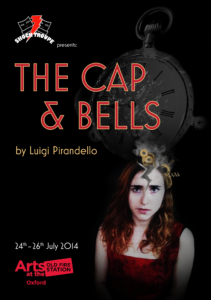
We present our own new version of this bizarre tragi-
Illuminating the background to Pirandello’s revolutionary innovations in his later plays, we aim to reintroduce English-
(The performance on 25th July 2014 was recorded. You can watch the recording on the event page for that night’s performance.)
Synopsis
Ciampa is a middle-
In a climate of unbridled hysteria, exacerbated by stifling social convention and small-
This is the story of how Ciampa’s philosophy fails him, when his boss’s wife, Beatrice Fiorica, becomes convinced her husband is sleeping with Nina. Without evidence to support her jealousy, she issues an official “denunciation” of the alleged affair…
Combining darkness with humour, Pirandello explores how many people Beatrice can pull down with her in her descent into insanity, pitting her in surreal competition against the clerk Ciampa, who claims ultimate knowledge of three watch springs within people’s heads. Surrounded by a retinue including Beatrice’s brother Fifi’, a gambling dandy-
Starring (2014 cast and crew)
Vinny Cochrane as Ciampa
Rhiannon Kelly as Beatrice
and
James Silk as Fifi’ La Bella
Moya B Hughes as La Saracena and Assunta La Bella
Elizabeth Kirkham as Fana
Gavin Gaughan as Inspector Spano’
Victoria Coleman as Ciampa’s wife, Nina
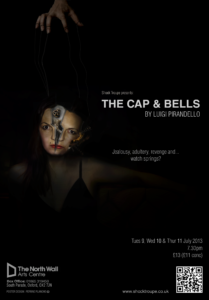
Director: L. Graham
Producer: Simon Image
Production Manager: Yasmin Skinner
Costume Designer: Lorna Pearson
Stage Manager: Neil Fisher
Production Assistant: Hayat Maryan
Original 2013 Cast and Crew (where different)
Beatrice: Juliet Humphrey
Fifi’ La Bella: Adrian Garcia-Miller
Fana: Sarah Chloë Thewlis
Inspector Spano’: Declan Tomàs Clowry
Nina (Ciampa’s wife): Flora Moujaes
Production Manager: Ashley Bale
Costume Designer: n/a
Production Assistant: n/a
Luigi Pirandello
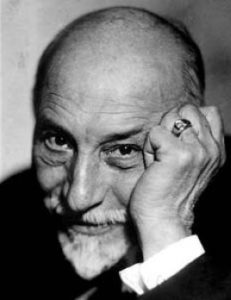
In 1910 Luigi Pirandello wrote to his friend Ugo Ojetti:
For five years now my wife has been mad. And her madness is me.
The daily reality of living with a paranoid schizophrenic was one of the major factors that transformed Pirandello from a narrator into a dramatist, and his 1917 two-
Life
Luigi Pirandello was born near Agrigento in Sicily in 1867. His parents were passionate supporters of Italian unification and their son inherited the desire to ‘make Italians’ out of the varied and contentious inhabitants of the peninsula.
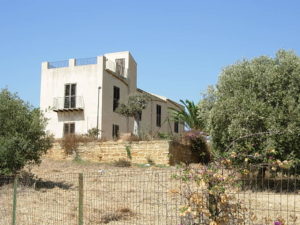
The family business was sulphur mining, and in 1894 he married the daughter of his father’s commercial partner, an arranged match which would prove decisive for his creative fortunes when, after the collapse of the family enterprise in 1903 as a result of flooding, his wife developed serious mental illness.
Works
He published his first short story Capannetta (Little Hut) in 1884 and continued to produce stories, novels, plays and articles until his death in 1936.
The novel Il fu Mattia Pascal (The late Mattia Pascal) of 1904 proved to be a new departure in Italian fiction and he moved into playwriting, a long held passion, during the years 1915–1918, proclaiming his drama to be a ‘theatre of war.’
His great experimental phase culminated in 1922 with the appearance of Sei personaggi in cerca d’autor (Six Characters in Search of an Author) and Enrico IV (Henry IV), perpetual favourites on the stage.
The later works explored the multifarious possibilities of drama, ending with the unfinished I giganti della montagna (The Mountain Giants) in 1936. He continued to publish short stories until a week before his death.
The Cap and Bells
Il berretto a sonagli (The Cap and Bells), written in 1916 and performed the next year, was originally conceived in Sicilian dialect, later translated into Italian, and largely neglected until taken up by the great actor-
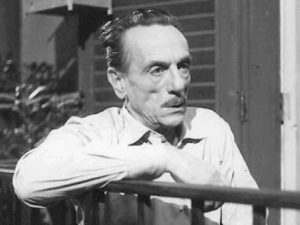
Eduardo included it in his repertoire for more than forty years, and a television version came out in 1980, when the actor was eighty years old.
Ciampa, the sharp-
It was written in a week: as Pirandello said, «nata e non fatta» – “born and not made.” Here, his family problems, Italy’s crisis, and the writer’s great themes of alienation and identity loss fused in a way perhaps never achieved so precisely again.
We enter the arena of combat between the obsessed mind and the rational intelligence, circling each other, fencing, testing the limits of endurance. But are they really distinct?
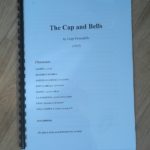
Although originally intending to base the production on a 1950’s translation, Simon Image (producer), upon spotting some significant errors in this, retranslated the original work for this performance in English.
It could be called a comedy, but it’s so sinister it isn’t funny.
Vinny Cochrane (Ciampa) on BBC Radio Oxford
While Europe tore itself apart in armed conflict, two tormented psyches battled for conquest of the truth. But whose truth…?

- The Cap and Bells was produced in 2013 and 2014 under the theatre company name ShockTroupe.

No Comments Yet